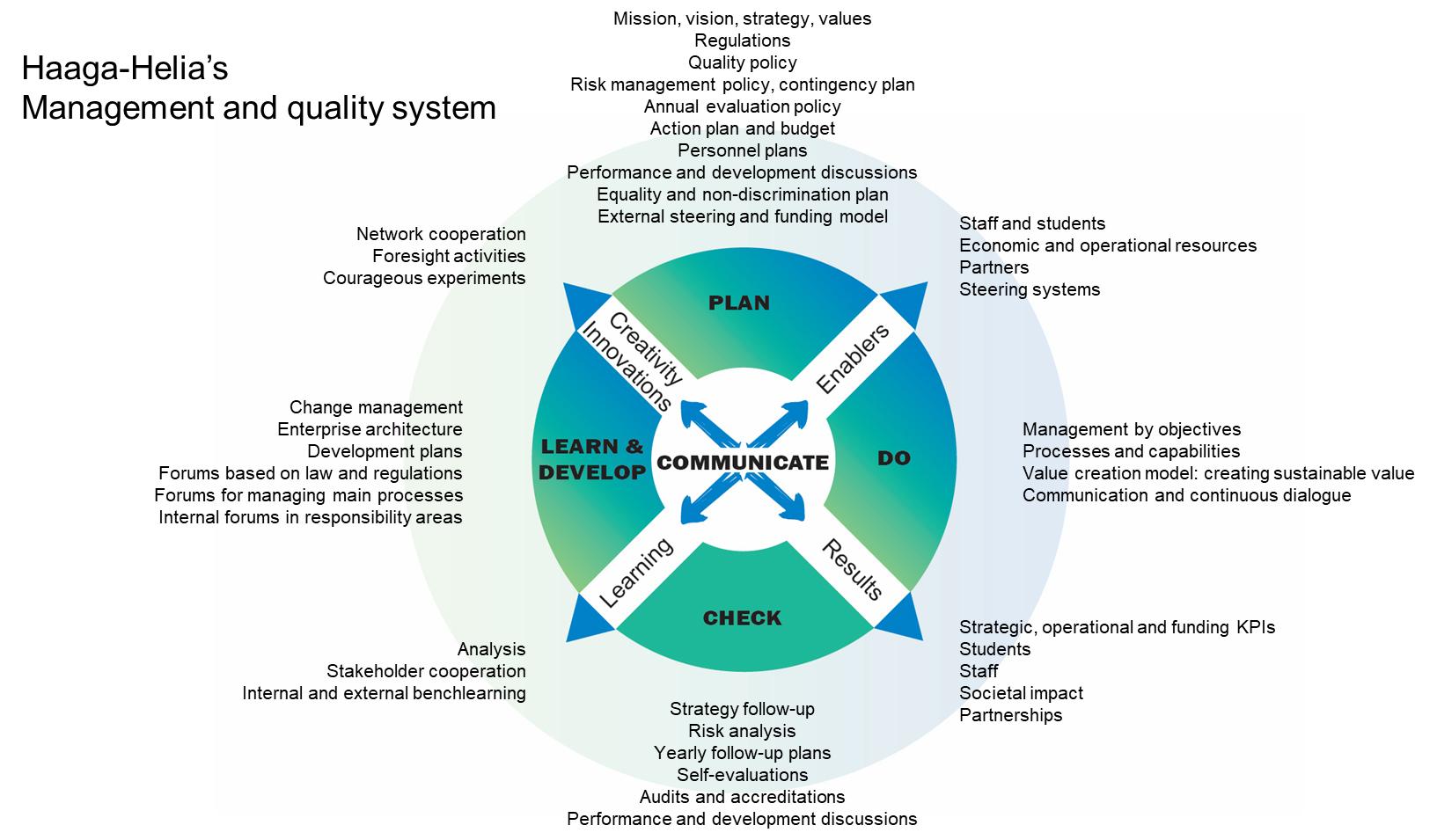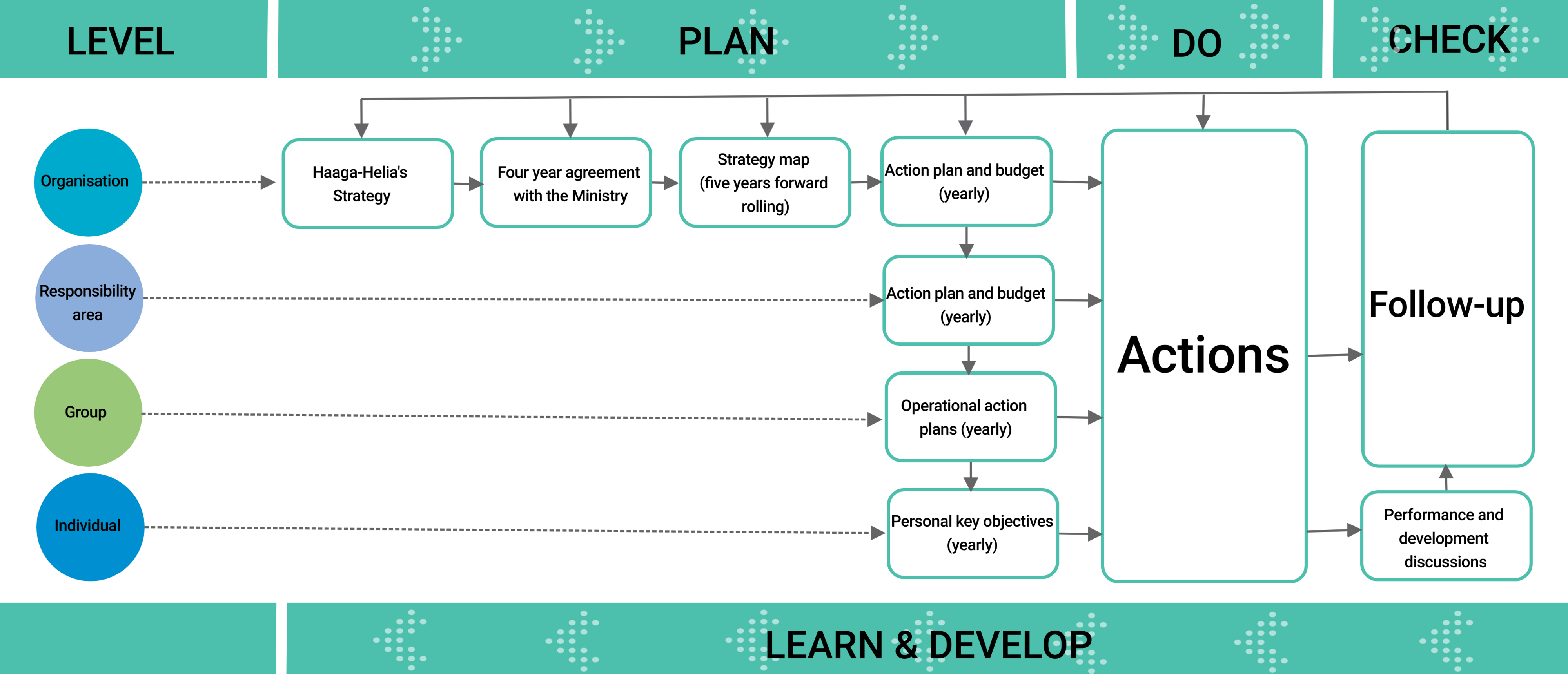Korkeakoulun itsearviointi

Picture 19. Haaga-Helia’s management and quality system
Quality process as a part of strategic management
In Haaga-Helia, the quality system is a part of everyday management and integrated in the management system. The objective of the quality system is to support implementing strategy and to provide reliable data for the management of operations. We have set strategic goals for every core duty, which also form the base of the new process-led organisation. Interlinking strategic goals, core duties and main processes aligns the organisation and its management and quality system to support the achievement of strategy. In the new organisational structure, even more emphasis is on the actions and development work crossing over the organisation boundaries, which is designed to diminish the silos identified as obstacles during the last strategy period.
Our strategy guides our development work together with goals negotiated with the Ministry of Education and Culture. A five-year rolling strategy map elaborates these goals and provides the basis for annual action plans for organisation, areas of responsibility, groups, teams and ultimately individual goals. Based on the organisation’s annual goals, the areas of responsibility plan their own annual operational goals in close interaction with their groups as well as the budget and staffing to support the implementation of the plan. Annual plans are approved by the Management Group and Board. In addition to being involved in the creation of annual plans, we have performance and development discussions to implement the plans for both the group and individual levels.

Picture 20. Strategic and operational planning and follow-up
Data management to support development
Throughout the process, we use both verbal and numerical goals. Numerical indicators are used to measure the achievement of a goal. The strategy is measured with strategic indicators, operations with financial and performance indicators, and quality with qualitative indicators. Together, the indicators form a comprehensive picture.
Since the previous audit, data production has been centralised. The task is to produce reliable and consistent information for the use of the organisation. We utilise information from both internal and external sources. Already, more than 40 PowerBI visualisation sites have been created to serve different users. In addition to ready-made visualisations, there is an annual plan to manage requests for information where the required information can’t be found on the PowerBI sites, allowing information to be provided in a timely manner to those who need it. The information is utilised for organisation-level monitoring (the Board, Management Group, Strategic Preparation Group), appropriately segmented for operational support in various functions (middle management and development groups) and in operational-level development work (staff).
We review the strategic goals and indicators during the strategy period annually when the strategy map is updated. We follow up action and budget plans during the year and are in the process of turning this into a systemised quarterly practice on every organisational level. In the performance and development discussions, we evaluate the previous year’s operations and follow the progress of the current year’s operations.
Staff participates actively in strategic and operational planning
Our staff participates actively in all the stages of the preparation: strategy, strategy map, action and financial plan, performance and development discussions. This increases common understanding and helps staff to implement the strategy. As a result, in the personnel survey 2021, the staff was well familiarised with the strategy. The goals at the group level were still less understood and the division of tasks between the groups was not yet clear, most likely due to the incompleteness of the new organisation at the time of the survey.
Responsibilities for quality management align with organisational responsibility from the management to an individual responsible of the quality of their own work. According to the organisational regulations, all staff are responsible for the quality of operations in their respective areas of responsibility. The quality system supports different levels of the organisation in the management and development of its areas of responsibilities, groups and teams, as well as in performance management.
| Strengths |
Enhancement areas |
| Strategy created in cooperation with stakeholders, and staff systematically involved in strategic and operational planning |
With a lot of development actions throughout the organisation, need for an open access internal project portfolio |
| As a strategy-led organisation, strategy is genuinely guiding all our operations and work |
Improving recognition of the connection of own work with the strategy through more active dialogue of strategic and operational plans |
| Systematic data management linked to strategy |
In addition to data monitoring, further improving the open systematic follow-up of planned actions |
Haaga-Helia’s quality policy is defined and openly available. It is supported by a quality system that is based on a cycle of continuous improvement along with the stages Plan-Do-Check-Learn&Develop-Communicate. The quality system has specified steering elements, processes, indicators and feedback systems. Strategic objectives have been set for each core duty and there are different development forums to support joint quality work and continuous development.
Based on the interviews, Haaga-Helia’s staff is familiar with Haaga-Helia’s strategy as well as with the link between the strategy and the goals of their own work. Especially teaching staff was well aware of Haaga-Helia’s strategic goals and its connection to everyday work in the institution. The interviewees brought up that as working life changes, teaching and the Haaga-Helia’s yearly strategic plan change with it.
Haaga-Helia is a strategy driven organization
Haaga-Helia’s strategy is public and the yearly action plans are available to everyone at Haaga-Helia. It became clear to the audit team that Haaga-Helia is a strategy driven organization and that its management is strongly committed to the quality system and its enhancement. The information produced by the quality system is also utilized in the development of operations in an appropriate manner.
Haaga-Helia’s strategy and its finances are at the core of managing the organization. In addition to the 5-year rolling strategy, Haaga-Helia makes a yearly action plan for each organisation, responsibility area, group and staff member. The audit team wondered whether this frequent cycle is making the process heavy to run, but according to the interviewed managers, the yearly action plans give the organization a possibility to react in an agile manner if some of the measured indicators show that the results are not according to the plan. The management representatives also told that a new tool has been introduced allowing them to set quarterly goals and to do follow up on the yearly action plan. This new strategic tool not only supports the follow up but also allows to follow action plans and goals of other responsibility areas and see what they have undertaken to achieve these goals. The audit team views it as a positive thing that the organization is looking for new tools and ways to enhance its follow-up systems.
According to the interviewees, the staff participates actively in the preparation of the strategy, the strategy map, the action plan and the financial plan. The audit team considers that the staff’s performance and development discussions both on a group-specific and a personal level are an important part of the quality system. The interviewed staff members estimated that the processes related to quality management are transparent.
Yet, according to the personnel survey of 2021, 19 percent of the respondents were unsatisfied with their teams’ opportunities to influence the development of operations. This concern did not come up in the interviews, but as Haaga-Helia’s quality system relies on feedback, e.g., from the staff, it is important to measure and observe this indicator in the future as well.
Haaga-Helia develops its operations based on feedback
The interviews and the self-assessment material gave the audit team the impression that continuous feedback from students, staff, companies, and external stakeholders plays an important role in Haaga-Helia’s quality system development. Haaga-Helia’s target is to reach a 50 % response rate on student feedback. Currently the rate is 30 – 40 %, and thus, there is still room for improvement. The graduand feedback percentage is almost 100 %, which suggests that Haaga-Helia should be capable of enhancing its feedback processes with other groups as well.
The staff members described in the interviews that it is possible to give feedback in different forms and at any time. The audit team sees that Haaga-Helia has succeeded in creating a positive culture when it comes to giving feedback and new ideas to improve the performance of the institution. However, in the interviews, more interaction with companies and external stakeholders was mentioned as an enhancement target. The audit team join this view that Haaga-Helia should enhance its systematic feedback procedures especially concerning feedback from companies and external stakeholders.

